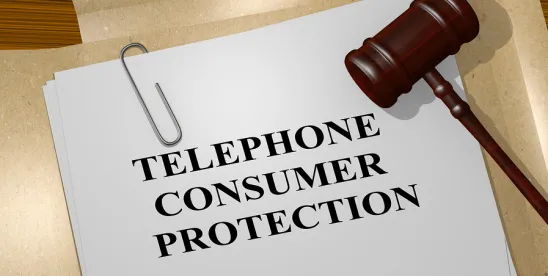Many had hoped that the summer of 2020 might bring the end of the TCPA as we know it, by way of the Supreme Court’s decision in Barr v. American Association of Political Consultants. Of course, that’s not how things played out. The government-backed debt exception is dead, but the rest of the TCPA is still very much alive. And while the pace of litigation has slowed because of the ongoing COVID-19 pandemic, TCPA decisions continue to roll in and there have been new developments before the FCC. We reviewed the TCPA cases published and other developments since our last update and compiled the most noteworthy items, listed below by issue category in alphabetical order.
Advertisement
One of the key questions in a TCPA fax case is whether the fax at issue is actually an advertisement. In Mauthe v. Millennium Health, LLC, 2020 WL 2793954, *1 (E.D. Pa. May 29, 2020), the court held that a one-page fax promoting a free seminar about urine drug testing was not an advertisement.
ATDS
Perhaps the most notable TCPA decision of the summer aside from Barr was the Sixth Circuit’s decision in Allan v. Pennsylvania Higher Education Assisistance Agency, 968 F.3d 567 (6th Cir. 2020), which was not good for the TCPA defense bar. In Allan, the court followed the lead of the Ninth Circuit in Marks v. Crunch San Diego, LLC, 904 F.3d 1041 (9th Cir. 2018), holding that a system that stores numbers to be automatically called is an ATDS, regardless of whether it randomly or sequentially dials those numbers. Id. at 580. Additionally, in Cannioto v. Simon’s Agency, Inc. 2020 WL 2808983, *2 (W.D.N.Y. May 29, 2020), the court denied a motion to dismiss for failure to adequately plead an ATDS because the plaintiff had alleged the use of a predictive dialer.
But other courts have ruled more favorably on ATDS issues in recent months. Panzarella v. Navient Sols., LLC, 2020 WL 3250508, *3 (E.D. Pa. June 16, 2020) (granting summary judgment to defendant on the ATDS issue); Herrera v. Navient Corps., 2020 WL 3960507, *7 (E.D.N.Y. July 13, 2020) (granting motion to dismiss for failure to adequately plead ATDS); Hampton v. Barclays Bank Del., 2020 WL 4698476, *30 (D. Kan. Aug. 13, 2020) (granting summary judgment to defendant on ATDS issue).
Notably, the passing of Justice Ginsburg could have a significant impact on how the Supreme Court ultimately resolves the question of what an ATDS is. The Supreme Court is poised to address that issue in Facebook v. Duguid, Case No. 19-511. Justice Ginsburg’s history suggests that she likely would have advocated for a broader definition of an ATDS. But it seems likely that any justice appointed by President Trump to replace her will take a narrower view.
Called party
In another significant — and potentially problematic — decision, the Ninth Circuit held that the defendant’s intent to place calls to a customer did not render the customer the “called party” and thus did not the exempt bank from liability under the TCPA. N.L. by Lemos v. Credit One Bank, N.A., 960 F.3d 1164, 1171 (9th Cir. June 3, 2020). The court held that “[i]n enacting the TCPA, Congress found that ‘[b]anning such automated or prerecorded telephone calls to the home, except when the receiving party consents to receiving the call . . . is the only effective means of protecting telephone consumers from this nuisance and privacy invasion.’” Id. at 1170.
Cell phone
In Chennette v. Porch.com, the court held that cell phones owned by businesses were not covered by the TCPA. 2020 WL 5511515, *2 (D. Id. Sept. 2, 2020). “This Court views the FCC’s intent is for the TCPA to apply to consumers, not business numbers like cell phones used by contractors. Since Plaintiffs allege they are contractors operating as a business, they are not covered under the TCPA.” Id.
Electronic faxes
The FCC reconfirmed earlier this month (in response to a petition prepared by Vedder Price – more on that to follow in this space) that “an online service cannot itself print a fax and thus is plainly not ‘equipment which has the capacity . . . to transcribe text or images (or both) from electronic signal received over a regular telephone line onto paper’ and thus does not meet the statutory definition of a ‘telephone facsimile machine.’” See In re Matter of Joseph T. Ryerson & Son, Inc., DA 20-1038.
Injury in fact
In Perez v. Golden Trust Insurance, Inc., the court held that the receipt of two unsolicited text messages was not enough to establish injury in fact for the purposes of standing. 2020 WL 3969277, *2 (S.D. Fla. July 6, 2020). The court held that the text messages were “isolated, momentary, and ephemeral.” Id.
Settlement
In a somewhat surprising decision, the Eleventh Circuit held late last week that it is not appropriate for a court to “rubber stamp” a class representative incentive fee award, finding that such an award must be supported. See Johnson v. NPAS Sols., LLC 2020 WL 5553312, *14 (11th Cir. Sept. 17, 2020).




 />i
/>i

